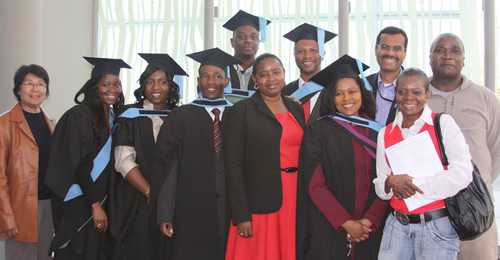FELTP Graduates Are Ready to Serve Public Health in South Africa

Dr. Khin San Tint (NICD field coordinator), Lungile Mbata, Esther Khosa, Thejane Motladiile, Maanda Mudau, Refilwe Mokgetle (staff field epidemiologist), Vusi Ntlebi, Miriam Malotle, Dr. Seymour Williams (resident advisor), Kate Nkau (program manager), Lazarus Kuonza (medical epidemiologist).
“Diseases don’t respect boundaries. Outbreaks can create opportunities to bring public health awareness and parties together to solve problems,” said Seymour Williams, MD, Resident Advisor for the South Africa Field Epidemiology and Laboratory Training Program (SA-FELTP). The skills gained while conducting surveillance, investigating outbreaks, and analyzing data are invaluable to SA-FELTP graduates and residents to help inform public health policy and practice.
Data can help save lives. As with many countries in Sub-Saharan Africa, epidemiology is a burgeoning field. Epidemiologists in South Africa are increasingly recognized for their vital role in providing critical data essential to a well-functioning public health system. The SA-FELTP residents bring a diversity of data gathering, analysis, and synthesis skills to the program from their careers as laboratorians, nurses, veterinarians, and physicians.
CDC South Africa is proud of their residents’ work, and how they have applied their skills to help strengthen public health in South Africa. Since 2007, all but 3 of the 38 graduates have remained in South Africa to address public health priorities. As part of their training, residents are assigned to provincial and national departments of health and to the National Institute for Communicable Diseases of the National Health Laboratory Service. Over the past 3 years, they have investigated several outbreaks, including cholera in Johannesburg, multi-pathogen diarrheal disease in Free State province, rabies in Limpopo province, and typhoid fever in Zimbabwe.
Residents have also separately evaluated multidrug-resistant hospital-acquired infections in North West and Western Cape provinces, tuberculosis (TB) treatment outcomes, and treatment uptake among newly diagnosed multi-drug resistant TB patients in Gauteng province.
SA-FELTP graduates are ever ready to do the important work they’ve been trained to do. For example, graduate Thejane Motladiile serves as the Monitoring and Evaluation Manager for the North West Provincial Office of the Department of Health. He recently co-published his SA-FELTP work in the Southern African Journal of Epidemiology and Infection.
His findings showed that MDR Acinetobacter baumannii was a major cause of hospital-acquired infections, causing high mortality and prolonged stays of infected patients in a private hospital’s ICU in the North West province. He and his co-authors recommended enforcing infection control procedures, improved case notification using surveillance data, and collaborating and communicating between public and private sectors to avoid and prevent nosocomial outbreaks.
“This program has empowered me!” said Motladiile, proudly holding his new MPH diploma. “The skills I learned through this program are important to the public health of South Africa.”
“We invest in our residents to help serve national and regional public health needs for South Africa and bordering countries,” said Willliams. “At the end of the day, as public health professionals, they need to not only convey important health messages, they need to use their skills to be part of the solution—to make a difference in people’s lives.”
- Page last reviewed: November 26, 2012
- Page last updated: November 26, 2012
- Content source:
Global Health
Notice: Linking to a non-federal site does not constitute an endorsement by HHS, CDC or any of its employees of the sponsors or the information and products presented on the site.


 ShareCompartir
ShareCompartir